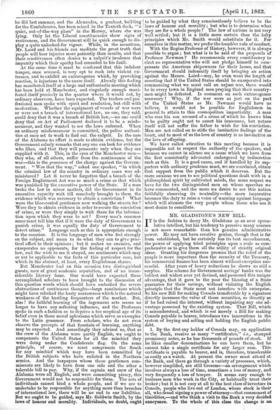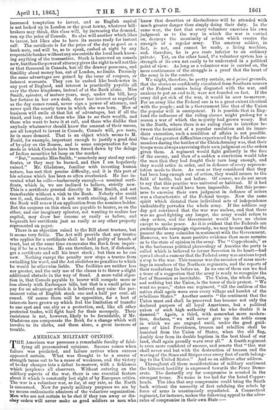MR. GLADSTONE'S NEW BILL.
TT is the fashion to decry Mr. Gladstone as an over specu-
lative intellect, but his tendency to perceive many courses- is not more remarkable than his genuine administrative power. He may not have creative genius, though that is far from established, but he certainly has its best succedaneum, the power of applying tried principles upon a scale so com- prehensive as to give them all the utility of strictly original ideas. Granting his dangerous premiss that the relief of the people is more important than the security of the Treasury, his commercial finance has been almost without exception suc- cessful. After years of heavy reductions he shows us still a surplus. His scheme for Government savings' banks was the boldest and widest ever yet devised, and possessed this unique advantage, that it gave to the poor the blessing of a State guarantee for their savings, without violating the English principle that the State must not interfere with enterprise. So his new Bill for making Consols transferable by a signature directly increases the value of those securities, as directly as if he had raised the interest, without impairing any one ad- vantage possessed by the existing system. That Bill, which is misunderstood, and which is not merely a Bill for making Consols payable to bearer, introduces two innovations in the system of buying and selling and holding the English public debt.
1. By the first any holder of Consols may, on application to the Bank, receive as many "certificates," i.e., stamped promissory notes, as he has thousands of pounds of stock. If he likes smaller denominations he can have them, but he cannot take a single certificate for any larger sum. This. certificate is payable to bearer, and is, therefore, transferable as easily as a watch. At present the owner must attend at- the Bank, and there go through a variety of processes, which, however simplified, are still tiresome—an arrangement which involves always a loss of time, sometimes a loss of money, and very frequently a loss of temper. It seems easy enough to business men who work in the City, or habitually trust their broker; but it is not easy at all to the best class of investors in Consols, people who live out of London, whose stock is their all, who dread signing a power of attorney—that commonest of timidities,—and who think a visit to the Bank a very decided annoyance. To the whole of this class the change is au
represented on paper. except to make peace. As it is evident that the Federals are
There is an objection raised to the Bill about trustees, but Pushing on the campaign vigorously, we may be sure that for the it seems very futile. The Act will provide that any trustee Present the army coincides in sentiment with the Government. who applies for a certificate shall be held guilty of breach of However, we have more positive evidence than mere surmise trust, but at the same time exonerates the Bank from inquir- as to the state of opinion in the army. The "Copperheads," as ang if he be a trustee. He can therefore, in fact, if dishonest, in the barbarous political phraseology of America the party is get a certificate and sell his trust stock ; but then so he can called which is believed to favour Secession in its heart—had now. Nothing except the penalty now stops a trustee from spread about a rumour that the Federal army was anxious to put swindling his ward, and the Act abolishes no penalties to which a stop to the war. This rumour was the occasion of mass meet- he would be otherwise liable. The facilities are neither less ings in numbers of the Northern regiments, and the reports of nor greater, and the only use of the clause is to throw a slight their resolutions lie before us. In no one of them can we find additional obstacle in the way of fraud. A more valid objec- a trace of a suggestion that the army is ready to recognize the tion is, that Consols payable to bearer will compete more or fact of Secession as inevitable. The Union, the whole Union, less closely with Exchequer bills, but that is a small price to and nothing but the Union, is the tenor of their protest. "We pay for an advantage which it is believed may raise the per- want no peace," states one regiment, "till the emblem of the immanent value of English stock one and a half per cent, all nation shall again wave over every village and hamlet of the round. Of course there will be opposition, for a host of rebellious States." Another asserts "the sentiment that the interests have grown up which feel the limitation of transfer Union must and shall be preserved has become not only the to one spot and one city as a protection, and, like all other declared purpose of all loyal Americans, but a political protected trades, will fight hard for their monopoly. Their axiom of such high authority that he who doubts it is resistance is not, however, likely to be formidable, if Mr. damned." Again, a third, with somewhat more modera- Gladstone can compensate the Bank for a change which will tion, declares, "we will never give up the noble cause involve to its clerks, and them alone, a great increase of in which we are engaged until, under the good guid-
trouble. ance of kind Providence, treason and rebellion shall be































 Previous page
Previous page